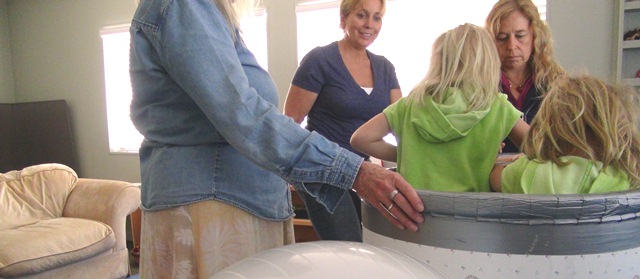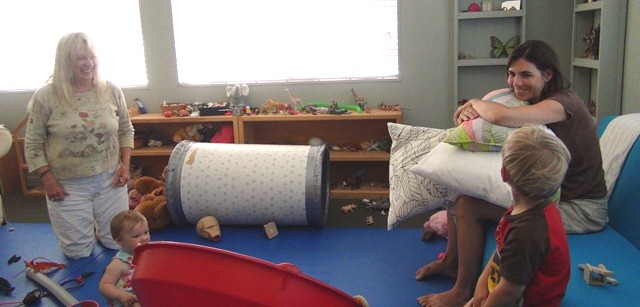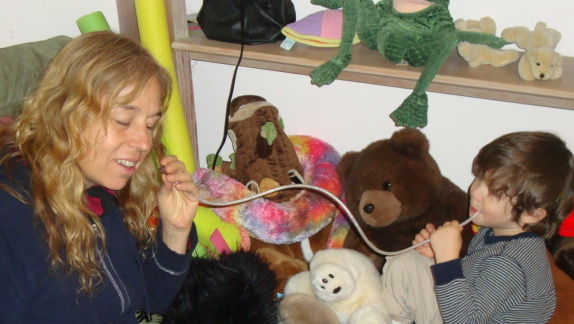
Overview
BEBA has two clinic locations- one in Ojai and one in Santa Barbara. Families come until the original trauma has been resolved and then are welcome to return on an as needed basis. Services are available on a sliding scale. Parents learn to understand what their babies/children are communicating with body language, symbolic play, behaviors and words about their earliest experiences; families learn ways of interacting and activities that will lead to resolution of early trauma and closer, more loving family bonds.
BEBA families work with trained facilitators who utilize approaches that respect the innate wisdom of the child and seek to understand the child’s perspective and experience. This model brings together the best of body oriented therapies and pre and perinatal psychology, including craniosacral therapy, playing, modeling, movement facilitation, role-playing and focusing on pacing, tempo and establishing harmonic resonance.

Who comes to the BEBA Family Clinic?
- Prenatal couples concerned that their own early experiences might interfere with their ability to bond with their children
- Families who have experienced prematurity, low birth weight, early medical problems and/or hospitalization of mother or baby, difficult pregnancy or births or other early important losses such as a death in the family, anxiety/depression or a high stress pregnancy
- Parents concerned about their infants who cried without apparent cause, have difficulty sleeping, have breastfeeding challenges, are unable to make eye contact, or who seem listless or slow to develop physical strength
- Families concerned about their toddlers who throw frequent tantrums, exhibit poor coordination and balance, are overly aggressive towards other children, isolate themselves, have difficulties focusing their attention or are hyperactive
- Couples and single parents who want to enhance their parenting skills
- Parents who want help bonding with their adopted children
- Parents who feel unduly frustrated or depressed about their family situation, are concerned about sibling rivalry or are unable to communicate satisfactorily with their children
- Parents seeking support to face acute conditions with their babies and children including hospitalization, surgery, parental death, and sexual abuse
Although BEBA works with families anytime from pregnancy until the children turn twelve, we have found that trauma imprinting can be resolved most effectively when it is addressed as soon as possible. For this reason, we prefer to see families as early as possible.

Sessions
BEBA clients are supported to explore their pre- and perinatal and post birth imprints. The BEBA philosophy asserts that if these issues can be expressed, integrated, re-patterned and/or released, the individual will be freer to live a more expressive and fulfilling life. BEBA facilitators use their skills to support this process.
Sessions usually last for 60-90 minutes and are billed by the minute. One or both parents is always present in every session. Some families come weekly, some bi-weekly and some once a month. Sessions are video taped (click here for more info). We support families to try BEBA for two sessions and if, for some reason they do not feel that BEBA is a match for them, the tapes of their sessions will not become part of the BEBA archive.
The length of time a family comes to BEBA is very individual. Some come for 6 months, some for a year. We find that the BEBA process naturally comes to closure as key issues get resolved. Some families will come back periodically for support after they complete the process. We ask that families return for a follow-up session at one or two year intervals, if possible. This enables us to follow and support your child(ren) and his/her development.
BEBA seeks to work with families in which there is no physical abuse, substance or drug addiction. It is also important that parents are committed to using non-violent methods of discipline.
Sessions for Parents: It is common for parents to get in touch with their own pre- and perinatal material as they participate in the sessions. When this happens, we suggest that they come and do some of their own work. Sometimes both parents come together and sometimes they come individually. These sessions are not required but we find that when a parent does his/her work, this helps very much the progress of their child/children.
Phone Support: Periodically parents may need to have extra time to speak with their facilitator. This happens when they have questions about something that occurred in the sessions or when they need support with a challenging situation at home. Also, sometimes a facilitator will think it is important to educate them or explain concepts and strategies. These phone calls are billed as sessions.
Benefits and Risks
Benefits: As Babies and children release stress and trauma imprints, they become more expressive, empowered and capable of relating.Parents often report improved relationship with their children that are more joyous, attuned and connected. They also describe their children as being more cooperative, more coordinated, having greater concentration, sleeping better, having improved health, enhanced learning abilities and the ability to relate more fully and give and receive love more directly.
As parents also explore their early imprinting issues they often report being able to access new levels of congruency with themselves, their family members and others. They are more empowered, creative, free to make choices and able to maintain supportive and fulfilling relationships.
Risks: As babies, children and parents explore their issues and imprinting, strong feelings and/or memories may arise. If this happens, participants can experience some emotions and sensations that may be uncomfortable or challenging to experience.